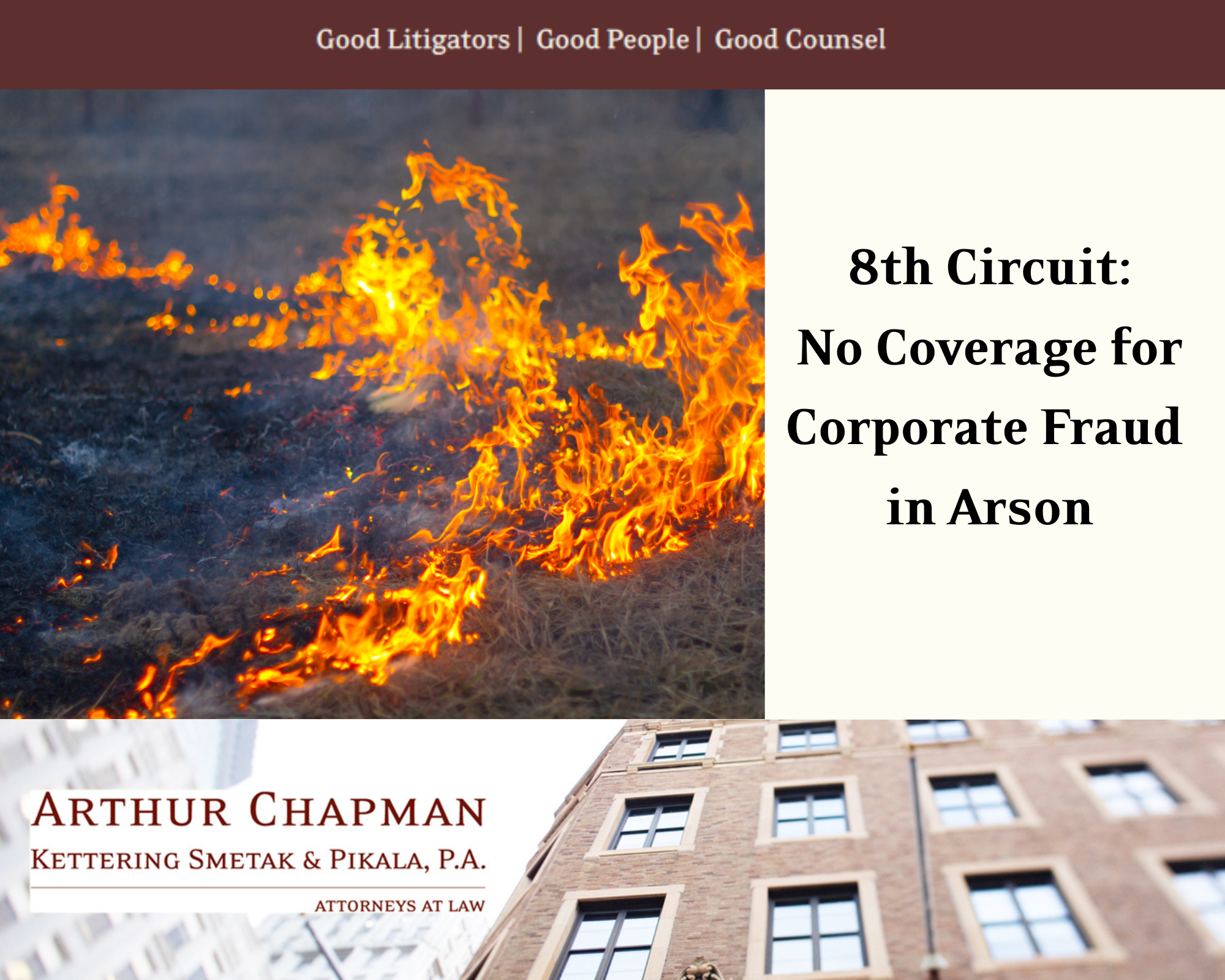On July 22, 2025, the Eighth Circuit issued Timeless Bar, Inc. v. Illinois Casualty Company, No. 24-2245 (8th Cir. July 22, 2025), reaffirming the district court’s grant of summary judgment to the insurer. In the case, the Timeless Bar in St. Cloud, MN, was fully destroyed by fire. Andrew Welsh and Jessie Welsh submitted a proof of loss on behalf of Horseshoe Club, LLC (which owned the building) and Timeless Bar, Inc. (which operated the bar). The proof of loss stated the fire was of “unknown origin” and “did not originate by any act, design or procurement on the part of your insured, or as affiant.” Andrew Welsh later plead guilty to arson.
Because this case involved a fire claim, Minn. Stat. § 65A.01, subd. 3, provides that the acts of each insured must be considered separately to determine if any willful or intentional act of “the insured” precludes coverage. For example in Hogs Unlimited v. Farm Bureau Mut. Ins. Co., 401 N.W.2d 381 (Minn. 1987), the partnership and each partner were separately named as insureds. The Court concluded that the acts of one partner in poisoning the partnership’s hogs and submitting a fraudulent proof of loss on behalf of the partnership, himself, and other partners did not preclude coverage to the other innocent partners who were separately named as insureds on the policy. Coverage was considered separately with respect to each insured. Coverage was precluded to the partnership.
Jessie Welsh brought suit against Illinois Casualty, arguing that this case was like Hogs Unlimited. She argued she was an innocent insured and that the actions of Andrew Welsh in committing arson and submitting a fraudulent proof of loss were not attributable to her. The district court granted Illinois Casualty’s motion to dismiss, holding that Jessie Welsh was not an innocent insured because she was not named as an insured on the policy.
Timeless Bar and Horseshoe Club made separate claims for coverage. They argued that Minn. Stat. § 65A.01, subd. 3, and the innocent insured doctrine precluded the court from imputing the misrepresentation of Andrew Welsh in submitting a fraudulent proof of loss on behalf of Timeless Bar and Horseshoe Club, LLC to Timeless Bar and Horseshoe Club. In essence, they argued that in the case of an arson by a co-owner of a company, the acts of one owner in submitting a fraudulent insurance claim on behalf of the company cannot be imputed to the company.
The Federal District of Minnesota and the Eighth Circuit refused to extend the innocent insured doctrine to preclude imputing the fraudulent acts of a co-owner to the insured company.
The Eighth Circuit concluded that “[a]cts taken within the scope of an officer’s authority—whether honest or fraudulent—are attributable to the entity.” “To extend the innocent-insured doctrine as urged by the entities would insulate businesses from the misconduct of those authorized to act on their behalf—something that does not find support in Minnesota law or its case law.” The Court therefore concluded that the fraudulent misrepresentations of Andrew Welsh on behalf of Timeless Bar and Horseshoe Club were the misrepresentations of Timeless Bar and Horseshoe Club because his misrepresentations were made within the scope of his authority to manage insurance for the companies.
* * *
Congratulations to Beth Jenson Prouty, Tim Carrigan, and Kari Dahlin who successfully obtained summary on this case before the Federal District of Minnesota and affirmation on appeal. To read more about the opinion, click here.
* * *
This case involved a joint effort from members of Arthur Chapman’s Insurance Coverage Group, Fire Litigation Practice Group, and Appellate Practice Group. Please reach out if we can handle your next coverage, fire, or appellate claim.



